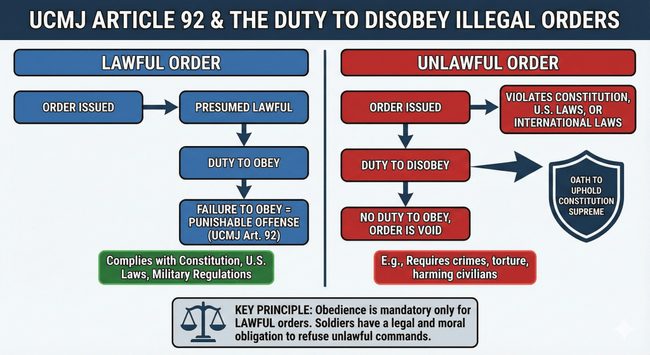UCMJ Article 92 & The Duty to Disobey Illegal Orders – 2025
Editor’s Note: This text (edited) was created by Gemini, November 20, 2025. The image is provided as CC0 1.0 public domain for use by anyone as needed.
The Uniform Code of Military Justice (UCMJ) does not explicitly have a section titled “constitutional duty to disobey illegal orders,” but its provisions clearly establish that military personnel are required to obey only lawful orders. Illegal orders—those that violate the Constitution, U.S. laws, or international laws—do not require compliance and must be disobeyed.
Relevant UCMJ Articles and Provisions
Article 92 (10 U.S.C. § 892) – Failure to Obey an Order or Regulation
This article makes it a punishable offense to disobey lawful orders or regulations. It applies only to lawful orders, implying that unlawful orders are not to be obeyed. Orders are presumed lawful unless they clearly violate laws or constitutional rights.
This article also emphasizes the obedience of lawful orders, with punishment for willful disobedience. It implicitly excludes unlawful orders from what must be obeyed.
Legal experts interpret this as underscoring that orders lacking valid military purpose or that violate the Constitution are illegal and must not be followed.
Legal and Constitutional Duty to Disobey Illegal Orders
Military personnel swear an oath to uphold the U.S. Constitution, placing constitutional duty above obedience to unlawful commands. They are legally and morally obligated to refuse orders that require criminal acts, torture, harming civilians, or violate treaties such as the Geneva Conventions.
The law and military legal commentary affirm that obeying illegal orders is not a defense for committing illegal acts (the “Nuremberg defense” is invalid). Service members have a responsibility to seek clarification, document, report, and refuse unlawful commands.
Illegal orders include any commands that contradict the Constitution, U.S. laws, lawful superior orders, or fall beyond the issuing official’s authority. The legality of an order can ultimately be decided by a military judge.
Summary
The UCMJ Article 92 governs obedience, but its text and interpretation make clear only lawful orders must be obeyed.
The constitutional duty to disobey illegal orders arises from the oath to defend the Constitution and the principle that illegal orders are void.
Military law supports refusal of orders that require crimes or violations of constitutional and international law, with protections for service members who do so lawfully.
This relationship is grounded in UCMJ Articles 90 and 92, intertwined with constitutional principles and military legal interpretations, providing a clear framework that service members must disobey illegal orders.
MLA Bibliography
- United States Code, Title 10, Section 892, Article 92. Office of the Law Revision Counsel. https://uscode.house.gov/view.xhtml?req=granuleid%3AUSC-prelim-title10-section892&num=0&edition=prelim. Accessed 21 Nov. 2025.
- Daniel Conway and Associates. “Article 92 Failure to Obey an Order.” Military Defense Law Offices. https://www.mcmilitarylaw.com/articles-of-ucmj/article-92-failure-to-obey-an-order/. Accessed 21 Nov. 2025.
- Cornell Law School. “10 U.S. Code § 892 – Art. 92. Failure to obey order or regulation.” Legal Information Institute. https://www.law.cornell.edu/uscode/text/10/892. Accessed 21 Nov. 2025.
- ABC News. “What the military oath of enlistment says about legal and illegal orders.” https://abcnews.go.com/Politics/military-oath-enlistment-legal-illegal-orders/story?id=127725085. Accessed 21 Nov. 2025.
- PBS NewsHour. “Trump says Democrats’ video message to military is ‘seditious behavior’ punishable by death.” https://www.pbs.org/newshour/politics/trump-says-democrats-video-message-to-military-is-seditious-behavior-punishable-by-death. Accessed 21 Nov. 2025.
- Law Offices of David P. Sheldon. “Unlawful Military Orders.” https://www.militarydefense.com/tag/unlawful-military-orders/. Accessed 21 Nov. 2025.
- Reddit. “Refusing an Unlawful Military Order: Your Legal Rights.” r/navy, https://www.reddit.com/r/navy/comments/1l8zbwp/refusing_an_unlawful_military_order_your_legal/. Accessed 21 Nov. 2025.
- Military Times. “4 in 5 US troops surveyed understand duty to disobey illegal orders.” https://www.militarytimes.com/opinion/commentary/2025/08/14/4-in-5-us-troops-surveyed-understand-duty-to-disobey-illegal-orders/. Accessed 21 Nov. 2025.
- Newsweek. “What US law says about sedition and troops defying illegal orders.” https://www.newsweek.com/what-us-law-says-sedition-troops-defying-illegal-orders-11084527. Accessed 21 Nov. 2025.
- CNN Politics. “Democratic lawmakers urge troops to disobey illegal orders.” https://www.cnn.com/2025/11/19/politics/democratic-lawmakers-urge-troops-to-disobey-illegal-orders. Accessed 21 Nov. 2025.
- Al Jazeera. “‘Punishable by DEATH’: Trump threatens Democrats with sedition charges.” https://www.aljazeera.com/news/2025/11/20/punishable-by-death-trump-threatens-democrats-with-sedition-charges. Accessed 21 Nov. 2025.
- Reddit. “Uncomfortable with the members of Congress who messaged to not…” r/AirForce, https://www.reddit.com/r/AirForce/comments/1p1b7d4/uncomfortable_with_the_members_of_congress_who/. Accessed 21 Nov. 2025.
- Facebook Group Post. “Military members obligation to disobey illegal orders.” https://www.facebook.com/groups/servicewhenwomencomemarchinghome/posts/24580730314894966/. Accessed 21 Nov. 2025.
- Military Law Task Force. “FAQ on Refusing Illegal Orders.” https://nlgmltf.org/military-law/2025/faq-on-refusing-illegal-orders/. Accessed 21 Nov. 2025.
- U.S. Army Courts of Criminal Appeals. “Core Criminal Law Subjects: Crimes: Article 91.” https://www.armfor.uscourts.gov/digest/IIIA15.htm. Accessed 21 Nov. 2025.
- Facebook Post. “President Trump called for lawmakers from the video to be arrested…” https://www.facebook.com/armytimes/posts/1245362770958632/. Accessed 21 Nov. 2025.
- United States. Uniform Code of Military Justice. Title 10, U.S. Code, §§ 890–933 (2025), Articles 90 and 92. United States Government Publishing Office, 2025.
- United States. Uniform Code of Military Justice. Title 10, U.S. Code, §§ 890–933 (2025), Articles 90 and 92. United States Government Publishing Office, 2025. https://www.law.cornell.edu/uscode/text/10/subtitle-A/part-II/chapter-47. Accessed 20 Nov. 2025.
#2025 #bibliography #constitutionalDuty #dutyToDisobeyIllegalOrders #gemini #geminiAi #googleGemini #internationalLaws #legalExperts #militaryJudges #mla #uSConstitution #uSLaws #ucmj #ucmjArticle90 #ucmjArticle92 #uniformCodeOfMilitaryJustice

